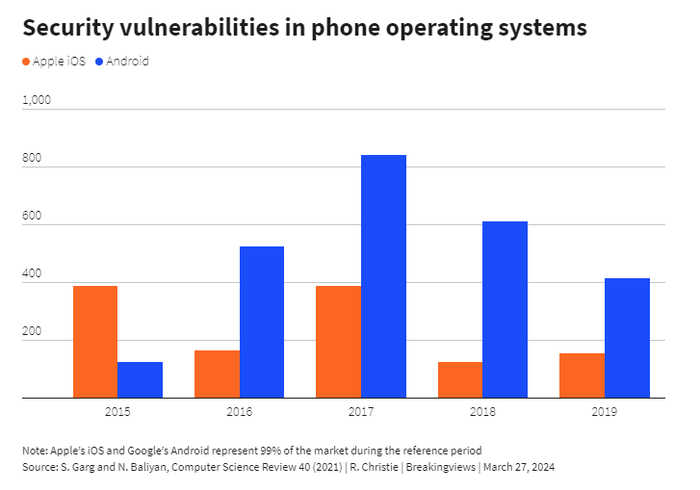Published 14:44 IST, April 10th 2024
EU tech rules bite ever-closer to Apple’s core
EU authorities want Apple to make it easier for competitors to set up app stores on its mobile devices, part of required changes under the new DMA act.
- Republic Business
- 4 min read

Tipping point. The European Union’s hit-rate against Apple is improving. After years of trying to get the $2.6 trillion technology giant to pay more taxes and open up its App Store, Brussels has assembled the regulatory clout to force changes. The result may be a clunkier iPhone experience, potentially affecting sales.
Apple on Friday said it would allow music streaming services to connect app users with other ways to buy content, such as providing their email address for a link to website downloads. The change is a response to a March fine over a 2019 antitrust challenge. The sector-specific move is a step towards the EU’s goal of getting Tim Cook’s Cupertino-based colossus to open up its iPhone software more broadly. Apple put forward some other changes in January, but longtime complainants like Spotify Technology boss Daniel Ek reckon those proposals altered little.
Two new developments suggest that skin-deep fixes may no longer cut it. First is Europe’s Digital Markets Act, which came into effect last month and forces the company and its Big Tech peers to offer consumers more alternative outside services. Brussels hence has a sounder legislative tool to fight Cook, along with the threat of chunky fines for non-compliance. It’s a more multipronged approach than previous efforts by long-serving competition tsar Margrethe Vestager, which relied on competition law and tax policy.
Another change is a new U.S. antitrust lawsuit against Apple, which also targets App Store operations. EU and U.S. authorities, at least for now, have a common goal, whereas past administrations in Washington perceived Vestager’s campaigns as an attack.
The upshot is that Brussels may be able to extract more than what Apple has so far put on the table, which includes allowing developers to distribute software to users outside of the App Store and changing the way it collects fees. This, in turn, could have an impact on iPhone sales. The device represents 58% of Apple’s revenues and in 2023 was the world’s top seller. Even a small reversal could bite into Apple’s bottom line.
Fans of the new rules say consumers will save money if developers no longer have to pay such high fees to Apple. The problem is, some of the changes may put users off. Both the U.S. and the EU want Apple to drop its bans on “steering”, or allowing developers to redirect consumers to independent websites where they can make purchases while skipping Apple’s fees. However, consumers may face a higher risk of malware or other threats, since the iPhone’s walled-garden system of inter-linked products and services makes it generally more secure.
This all adds up to more interface changes, more hassle and not necessarily a better product. That’s a risk for Apple, whose handsets are generally pricier than the Android-based alternatives. If Brussels’ efforts mean that Cook can no longer promise superior security and an effortlessly sleek interface, some users might just leave the orchard.

Context News
Apple on April 5 announced measures to make it easier for music-streaming services to inform users of other ways to buy digital services. The move was a response to a $2 billion fine from the European Union in March for thwarting music-streaming competition. The European Commission is evaluating Apple’s response. European Union authorities want Apple to make it easier for competitors to set up app stores on its mobile devices, part of required changes under the new Digital Markets Act. Regulators on March 25 launched a regulatory investigation into Apple’s “steering” rules, which limit developers’ ability to send users to websites or other purchase platforms. Reuters reported on April 10 that independent browser companies in the EU have seen a spike in users since the DMA came into effect. U.S. antitrust authorities on March 21 filed suit against Apple for practices designed to keep iPhone customers from switching to another type of device.
Updated 14:44 IST, April 10th 2024